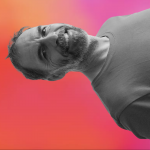I am an artivist and my purpose in life is to contribute to the construction of the social organism as I would a work of art, one situation at a time, one action at a time.
And how do we do that? By becoming aware. An awareness that implies determination and personal autonomy in order to then cooperate with other people and together, in a network, co-create larger entities.
With that intention, during the last 30 years, I have gone through 3 stages: first I painted conflict; then I looked for solutions to conflict; and, finally, I inhabited conflict.
In the first stage I was conscious of being a painter. I had an interpretation for the world. I studied and graduated in Fine Arts. I travelled to “Lat-indo-America” and painted the impacts of war and inequality.
In the second stage I put my brushes at the service of other people. I joined the Gernika Gogoratuz Peace Research Centre and experienced an opposite process to that which was advocated by Mao Tse-tung in Yenan: instead of tempering my art towards the comprehensible level of the non-artist, it was non-artists who tempered my “social realism” towards the degree of evolution of Peace Studies. From Gernika I developed the methodology ‘Dia-Tekhnē or Dialogue through Art’ consisting of bringing the tools of art to any person or collective with the goal of recreating democratic construction by means of three spaces: the “individual house” for participation without exclusion; the “interpersonal street” for mutual tolerance, empathy and otherness; and the “collective square” for the co-creation of a group contract or an agreement of cohabitation. The fruits of our labour from Dia-Tekhnē were abundant: more than 30 international interventions; countless local interventions; and a score of publications including books, catalogues, chapters and articles. Until that cycle was exhausted.
And in the third stage, I immersed myself in the entrails of individual, interpersonal and group conflicts. I trained in various social technologies – Theory ‘U’ or Change Lab, Process Work, Forum Theater and Systemic Facilitation – as well as in alternative conflict resolution mechanisms – mediation and interest-based negotiation – and then I set myself up as a ‘facilitator’ at the service of other people and collectives. I designed tools and itineraries for difficult dialogues and peace building, and accompanied numerous processes of citizen participation and organizational change.
After three decades of experience, I can synthesise everything into one simple act that is better stated as one laborious and complex behaviour: listening.
The last three years (2019-2022) I collaborated with the Colombian Commission of Truth as a consultant where I accompany teams of recognition and psycho-social accompaniment. This experience has permitted me to listen to collectives of conflict-torn victims and also to the murderers who were responsible for atrocious crimes and I helped them on their journey to reconnect with their lives.
The 4 Matryoshkas- Manual for a better understanding. (Download PDF)
The talk’s video includes a manual with two tools:
1) the Matryoshkas description, to better understand ourselves; and
2) the 6-step guide for an æffective dialogue, based on listening as a revolutionary action.
Necesitas aceptar las cookies de YouTube para ver este vídeo. Al aceptarlas, accederás al contenido de YouTube que es un servicio externo a la web.
Si aceptas, la página se refrescará para que puedas ver el vídeo.

